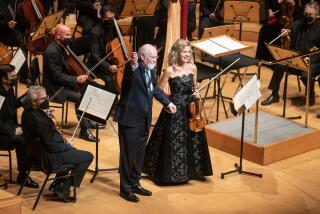Time travel through song
- Share via
The past is always available to enrich the present, especially in music. That was the impression vividly conveyed Saturday afternoon by conductor Martin Neary and his 15 excellent Millennium Consort Singers, who performed at the First United Methodist Church of Pasadena as part of the Da Camera Society’s Chamber Music in Historic Sites series. They are scheduled to repeat the concert in Pomona College’s Bridges Hall of Music on Feb. 1.
The company effortlessly spanned the centuries in a program of mostly a cappella anthems by Henry Purcell, Jonathan Harvey and Ralph Vaughan Williams as well as Vaughan Williams’ Mass in G minor. But the concert’s structure was unconventional, with Neary inserting some of Purcell’s and Harvey’s anthems in between sections of the Mass. Thus the Gloria, the Mass’ second section, was immediately followed by Purcell’s “Thou Knowest Lord,” and so on.
The opener, “I Was Glad,” showed the 17th century Purcell using dissonant chords that might have come from the pen (or computer) of Harvey, an electronic-music composer. By contrast, Vaughan Williams’ Mass, written in 1920-21 for double chorus and four soloists, harks back to the English Renaissance of William Byrd and Thomas Tallis. One heard the elegant lines and sophisticated polyphony of the earlier masters, but what Neary elicited most strongly was Vaughan Williams’ harmonically resourceful symphonic style applied to unaccompanied voices.
Since the Mass has fallen into the “neglected-classics” category, it was a special treat to hear it so ravishingly sung. Moreover, each singer’s ability to hold the spotlight -- almost all of them had solo turns at some point in the program -- bodes well for this California-based consort, which made its debut under Neary last spring.
The revelation of the afternoon -- and the neo-Gothic church was an acoustically friendly setting for it -- came in two spectacularly successful anthems by Harvey. “The Dove Descending” (1974), an incantatory setting of “Little Gidding,” the last of T.S. Eliot’s “Four Quartets,” adds an organ -- sensitively played by Edward Murray -- to the mix of voices, underlining the poem’s meditative power. And in the haunting “Come, Holy Ghost,” from 1984, the simplicity of the plainsong tune, “Veni creator spiritus,” evolves into a gripping cacophony of irregular meters, diverging harmonies and solo lines, with each singer advised in the score to “be careful to avoid singing together with anyone.”
Harvey, a boy chorister who grew up to embrace Babbitt and Stockhausen, locates much of the intellectual and emotional appeal of his work in the blending of ancient and modern. In Neary, he has found an authoritative champion of his affecting ecclestiastical music. So it’s no surprise when the score’s final lines return to the medieval Gregorian chant. Here, Neary and his gifted consort took the audience back to the future.
More to Read
The biggest entertainment stories
Get our big stories about Hollywood, film, television, music, arts, culture and more right in your inbox as soon as they publish.
You may occasionally receive promotional content from the Los Angeles Times.










